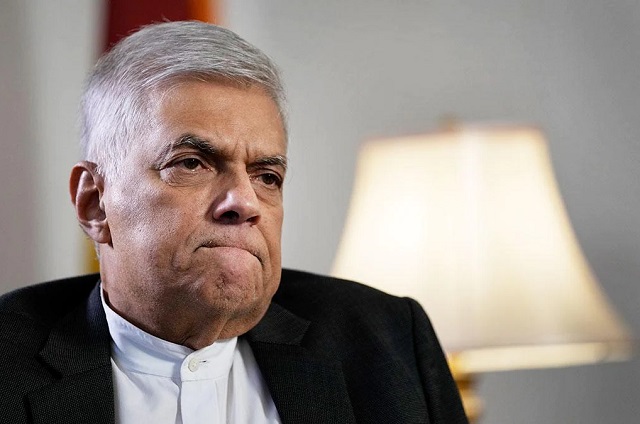-By LeN Legal Affairs Correspondent

(Lanka-e-News -03.June.2025, 10.45 PM) In a development that could have significant political and legal repercussions, the Supreme Court of Sri Lanka today (June 3) granted leave to proceed in two fundamental rights petitions filed against former President and Finance Minister Ranil Wickremesinghe, concerning the allegedly unlawful issuance of liquor licences in the lead-up to the 2024 presidential election.
The petitions claim that Wickremesinghe, in his capacity as Finance Minister at the time, alongside several senior government officials, violated the fundamental rights of Sri Lankan citizens by authorising the distribution of new liquor licences in contravention of excise laws—particularly after the presidential election was officially announced on July 26, 2024, and up until polling day on September 21.
A three-judge bench comprising Justices Yasantha Kodagoda, Janak de Silva, and Mahinda Samayawardhena issued the directive, also instructing the Commissioner General of Excise to submit to court a complete list of all liquor licences granted during the said two-month period, as well as the total number of licences issued throughout 2024.
The petitions were filed by Dhanendra Raja Thangavelu, a businessman from Matale, along with others, alleging that the rush to distribute new licences was a calculated move to curry political favour, reward loyalists, and influence voters during a tightly contested electoral season.
Among those named as respondents in the petitions are former President and Finance Minister Ranil Wickremesinghe, Finance Ministry Secretary Mahinda Siriwardena, and former Excise Commissioner M.J. Gunasiri. The petitions specifically allege a “pattern of abuse” involving the favouring of relatives and political allies—one instance highlighting that a liquor licence was even granted to the 19-year-old son of former Minister Shantha Bandara.
Appearing for the petitioners, President’s Counsels Sanjeewa Jayawardena and Saliya Pieris presented a damning case, arguing that the issuance of licences during the designated pre-election period was not only ethically questionable but legally impermissible. The counsels submitted that the licences were handed out in violation of the Excise Ordinance and relevant election laws, and had the effect of undermining the sanctity of the electoral process.
“The evidence will show that these licences were political gifts—designed to reward cronies and grease palms under the veil of ministerial authority,” said one of the counsels during today’s hearing. “The issuance of these licences wasn’t administrative policy—it was electoral patronage at its most brazen.”
They further noted that the Association of Liquor License Holders had formally complained to the Election Commission during the 2024 polls period, raising serious concerns that the sudden proliferation of liquor outlets was not only distorting the marketplace but also breaching electoral integrity.
In an attempt to dismiss the petitions, Additional Solicitor General Viveka Siriwardena, appearing for the Attorney General’s Department, argued that the cases were time-barred and lacked sufficient merit. She told the Court that the regulatory framework under which the licences were issued has since been repealed and replaced by a new excise regime.
“The petitioners are attempting to litigate on regulations that no longer exist, and in doing so, they have conveniently failed to disclose material facts to the Court,” Siriwardena stated, urging dismissal on procedural grounds.
Nonetheless, after hearing arguments from both sides, the Supreme Court decided that the issues raised in the petitions warranted full judicial scrutiny. The bench scheduled the next hearing for November 19, 2025, allowing all parties ample time to submit further documents and clarifications.
This decision marks a rare moment of institutional accountability in a country where executive privilege and ministerial discretion have long shielded those in power from judicial oversight. It also reignites a broader public discourse on the credibility of financial governance under Wickremesinghe’s administration, which has already been under fire over large-scale fiscal mismanagement, questionable procurement practices, and allegations of nepotism.
The timing of these revelations is particularly sensitive as the new National People's Power (NPP) government, led by President Anura Kumara Dissanayake, continues to audit the actions of the previous regime. Already, the current administration has raised red flags about excessive and unauthorised spending in multiple ministries—including the Ministry of Health's procurement of substandard haemoglobin supplies, extravagant Foreign Ministry postings under Minister Ali Sabry, and mismanagement of SriLankan Airlines funds.
In that context, today’s Supreme Court decision could be the first judicial step towards unwinding what some are now calling the “last loot” of the Wickremesinghe presidency.
What remains to be seen is whether this case triggers further legal action—or merely becomes another symbolic episode in the long saga of Sri Lanka’s struggle to uphold public accountability. Yet, in a country where judicial independence has often been more ornamental than operative, the Supreme Court's willingness to entertain these petitions has not gone unnoticed.
For now, a wary public awaits not just more revelations—but results.
-By LeN Legal Affairs Correspondent
---------------------------
by (2025-06-03 17:08:42)
Leave a Reply